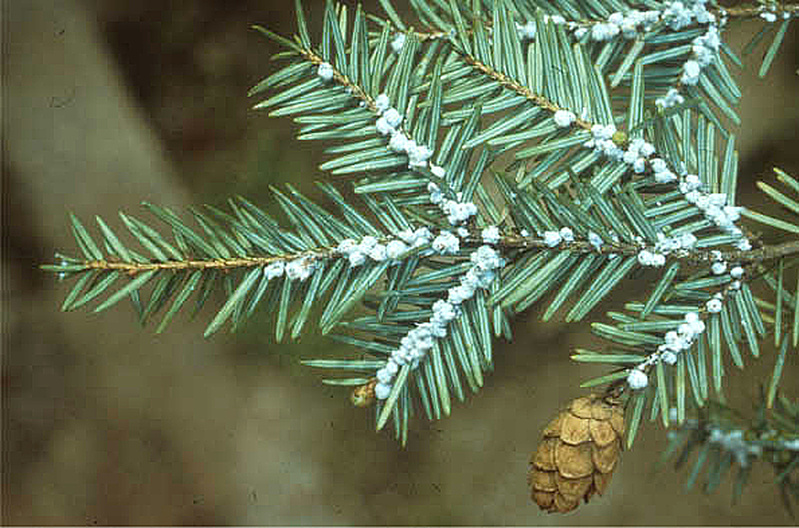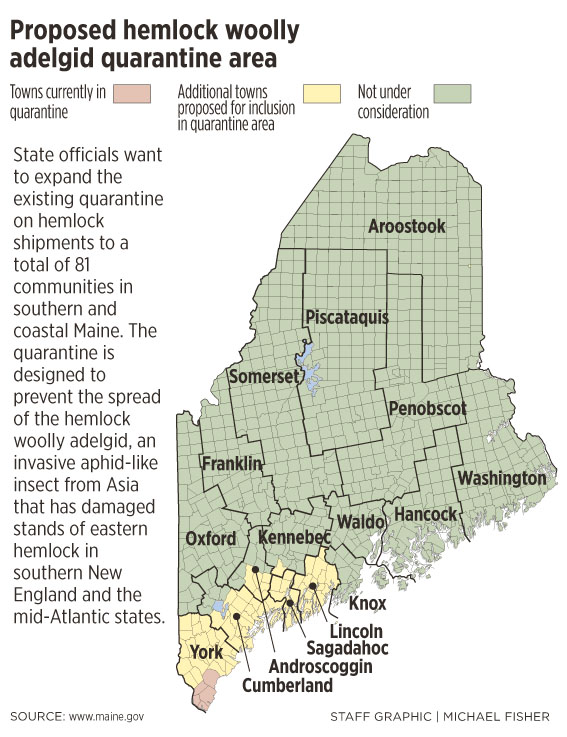The state is proposing to add 81 Maine communities and some places beyond its borders to the areas that are quarantined against the spread of the hemlock woolly adelgid, an invasive pest that has caused extensive damage to trees in other parts of the nation.
Under regulations last revised in 2007, only six towns are under quarantine for the pest: Eliot, Kittery, Ogunquit, South Berwick, Wells and York. When an area is quarantined, the movement of hemlock material from that area is restricted.
The proposed rule would extend the quarantine to all of York, Lincoln and Sagadahoc counties, and to selected communities in Androscoggin, Kennebec and Cumberland counties, including Portland, South Portland, Falmouth, Cape Elizabeth, Scarborough, Standish and Westbrook.
Hemlock from Alaska, California, Oregon and Washington and the Canadian province of British Columbia also would be covered by Maine’s quarantine.
In Maine, hemlocks are used primarily for paper pulp and saw timber — such as two-by-fours — and are the third-most valuable harvested trees, trailing only spruce-firs and white pines.
Fifty percent or more of nearly 300,000 acres of forest are hemlock, with an estimated annual value of $6.73 million, said Ken Laustsen, Maine Forest Service biometrician.
Most of the communities in the quarantine proposal are in southern coastal Maine, where warmer winters and wetter conditions tend to be more favorable to the spread and survival of the hemlock woolly adelgid, said Ann Gibbs, a horticulturist with the Department of Agriculture, Conservation and Forestry.
“It has been slowly spreading,” Gibbs said. “Mild winters really seem to be the key.”
The proposed quarantine, which will be the subject of a public hearing Wednesday in Augusta, covers most rooted hemlock plants. Logs would exempt from the quarantine.
The hemlock woolly adelgid is not considered a particular problem in firewood, because it needs live tissue to survive.
All of Maine is already under quarantine for firewood from other states, to prevent the spread of certain species of wood-boring beetles. That ban has been in effect for the last three years.
The hemlock woolly adelgid is an aphid-like insect from Asia that, in Maine, attacks only Canadian hemlocks, Gibbs said. As of 2011, infestations were in 18 states from Maine to Georgia, foresters reported.
Hemlocks struck by the pests often display extensive damage and suffer serious decline or die. The pests do not affect pine, spruce, fir or other conifer trees.
A covering of waxy filaments resembling wool is produced as the insect matures.
Woolly masses, ranging from about one-sixteenth inch to one-eighth inch in diameter, are the most obvious sign of infestation.
Horticultural oil can be an effective treatment, but experts advise help from a professional landscaper, pesticide specialist or arborist to make sure the problem is eliminated.
Maine residents should not be alarmed by the substantial increase proposed in the quarantined area, Gibbs said.
In part, it is a function of years of spread of the pest and a rule-making process that can be slow, cautious and cumbersome, she said.
“It’s going up the coast” and penetrating into predictable areas, Gibbs said.
The adelgid was detected in 20 to 30 of the proposed quarantined communities in 2010, when an especially mild winter created ideal conditions for the pest. The state is seeking to stop the spread of the pest and preserve specific areas with stands of Canadian hemlock.
The expanded quarantine would help buy time for the state to institute preventive programs, such as releasing species of beetles that feed on the adelgid. Such efforts aren’t immediately effective throughout an entire system, Gibbs said. They take time to work.
First detected in forests in Maine 10 years ago, the hemlock woolly adelgid spreads on nursery stock or on branches with needles carrying eggs, said Allison Kanoti, an entomologist with the Department of Agriculture, Conservation and Forestry.
Though its spread has been limited mostly to within 100 miles of the coast, it is continuing to move north.
The hemlock woolly adelgid has struck stands of hemlocks in southern New England and has been particularly damaging from the mid-Atlantic states to the Smoky Mountains, said Maine state entomologist Dave Struble.
North Cairn can be contacted at 791-6325 or at:
ncairn@pressherald.com
Send questions/comments to the editors.




